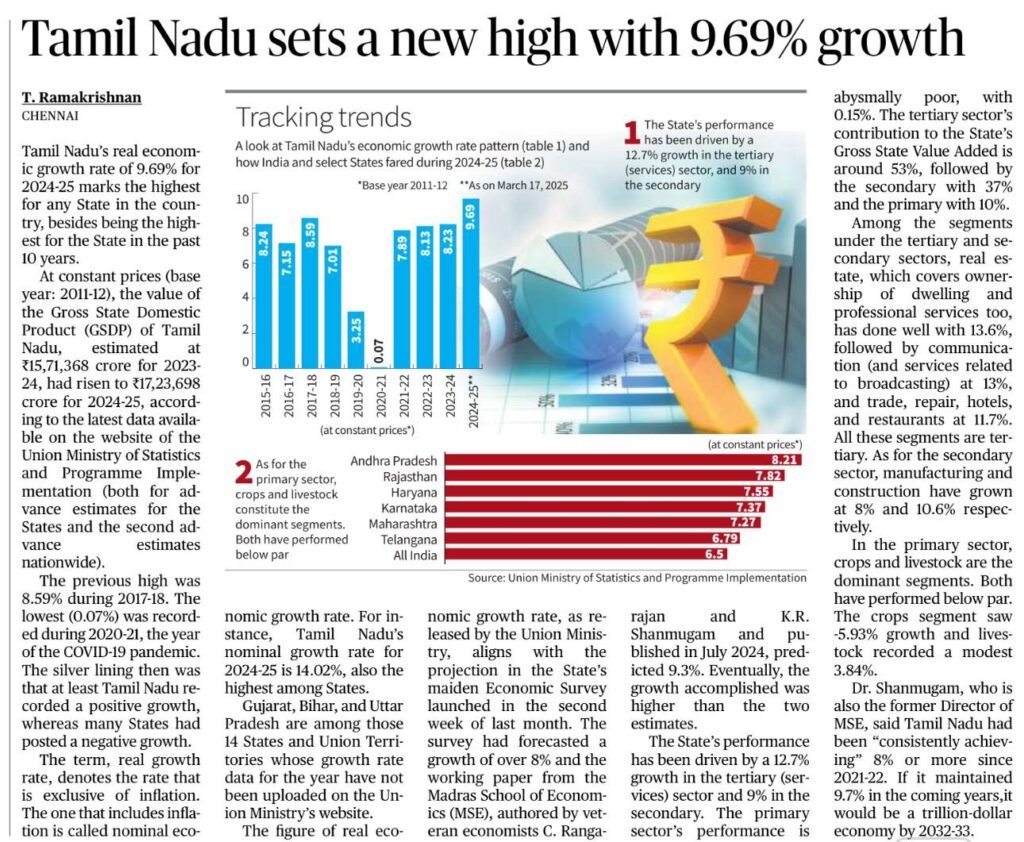

They incorporate the editorial’s central argument that the 2026 elections should focus on economic outcomes and wealth creation, not identity politics .
- Tamil Nadu recorded a per capita income of ₹1.96 lakh in 2024–25, second highest among Indian states—just below Karnataka’s ₹2.05 lakh.
- The state’s growth rate was 9.69%, the fastest in India for the same period.
- In contrast, the national per capita average stood at ₹1.15 lakh, up from ₹72,805 in 2014–15—a rise driven largely by southern states like TN, Karnataka, and Telangana.
- Data highlights stark disparities: Uttar Pradesh, for example, lags well behind with per capita income around ₹84,000.
✍️ Wealth Over Identity Politics
- The editorial urges political discourse to move beyond identity and rhetoric, focusing instead on economic prosperity and equitable wealth distribution.
- It emphasizes actions like boosting investments, generating real revenue, and expanding social welfare as the essence of genuine economic progress.
🏭 Tamil Nadu’s Growth Model & Governance Approach
- TN’s success is credited to a balanced economic model with strong infrastructure and a skilled workforce. This strategic approach has directly contributed to its high growth and income figures.
- Chief Minister M.K. Stalin and Finance Minister Thangam Thennarasu highlighted that per capita income doubled under the current DMK-led administration, rising from ₹1.43 lakh in 2020–21 to ₹1.96 lakh in 2024–25.
- They project that Tamil Nadu will become India’s top state in per capita income under the forthcoming ‘Dravidian model 2.0 regime’ following the 2026 elections.
🗳 Upcoming 2026 Assembly Election
- The state’s ruling party DMK is positioning itself with a forward-looking stance: the election should be fought on economic performance, not communal or caste-based appeals.
- DMK has launched outreach initiatives like ‘Ungaludan Stalin’ grievance camps, ‘Oraniyil Tamil Nadu’ scheme awareness drives, and ground-level events to translate impact into votes.
- The broader political scene features emerging players—Vijay’s TVK (Tamilaga Vettri Kazhagam) is organizing a youth‑centric grassroots presence with over 70,000 booth agents preparing to contest in 2026.
⚖️ Contrasting Regional Narratives
- Opposition in states like Bihar, UP, and Madhya Pradesh continues to lag behind southern states owing to structural hurdles such as poor industrial infrastructure and governance, as acknowledged by Union Minister Pankaj Chaudhary.
- Critics, including TTV Dhinakaran of AMMK/NDA, argue that TN’s economic gains depend heavily on central schemes, challenging DMK’s ownership over prosperity. They forecast a coalition government in 2026 led by the NDA in Tamil Nadu.
- The narrative—centre the 2026 election on economic outcomes rather than identity politics—marks a critical shift in how state politics is being framed in Tamil Nadu.
- The editorial critique implicitly highlights the limits of identity-based platforms in the face of concrete economic performance metrics.
- Tamil Nadu’s model underscores the potential of state-led strategic governance and investment-driven growth, challenging traditional approaches and may serve as a benchmark for other states.
- These developments take place against a backdrop of larger dynamics: rising southern confidence, federal political friction, and broader debates over national seat delimitation and resource allocation.
🧾 Summary
| Area | Details |
|---|---|
| TN per capita income | ₹1.96 lakh in 2024–25 (2nd highest; behind Karnataka) |
| Growth rate | 9.69% in 2024–25 — fastest in India |
| National average | ₹1.15 lakh in 2024–25 |
| Growth since 2014–15 | ~58% nationally; TN recorded ~83% |
| Key drivers | Infrastructure investment, induction of skilled labour, industrial focus, welfare delivery |
| Electoral framing | Election debates should center on economic well-being rather than identity or symbolism |
| Political strategy | DMK’s welfare-led, ground-connected outreach campaigns (e.g. ‘Ungaludan Stalin’, ‘Oraniyil TN’) |
| Opposition angle | Critics claim central support, not state governance, is behind Tamil Nadu’s economic performance |
